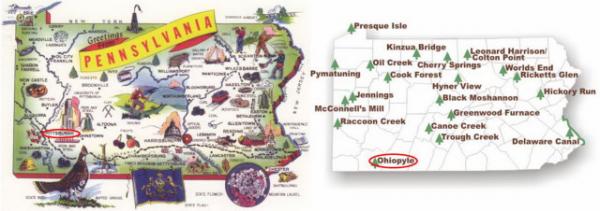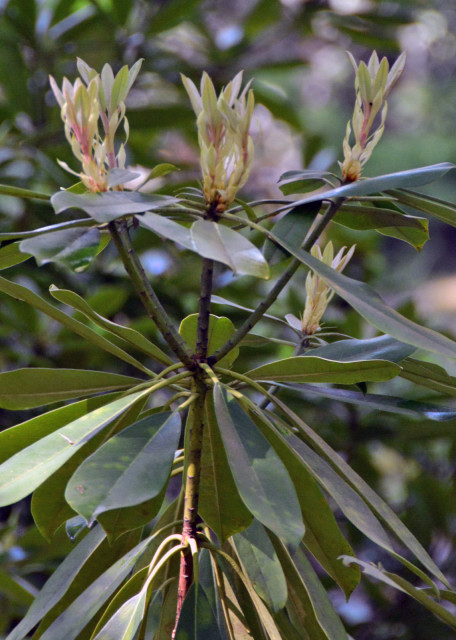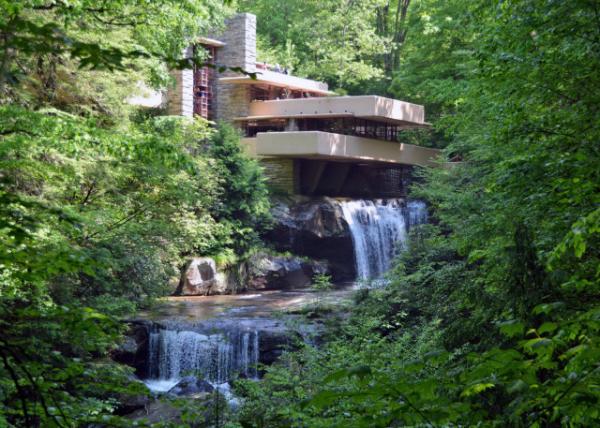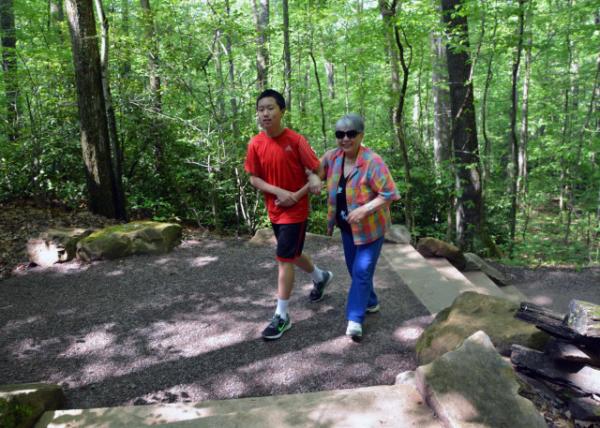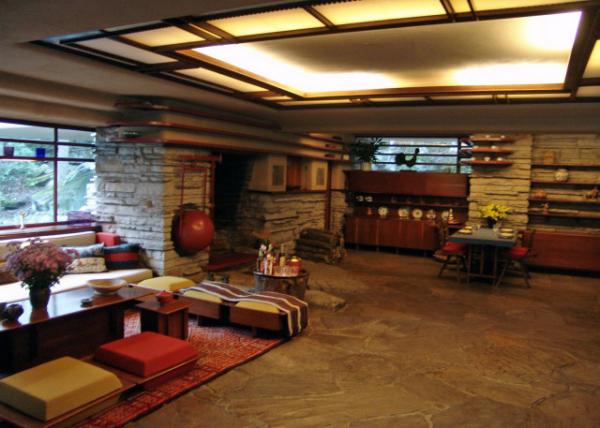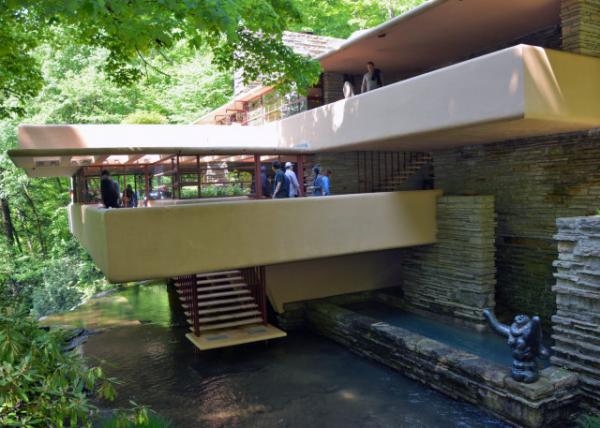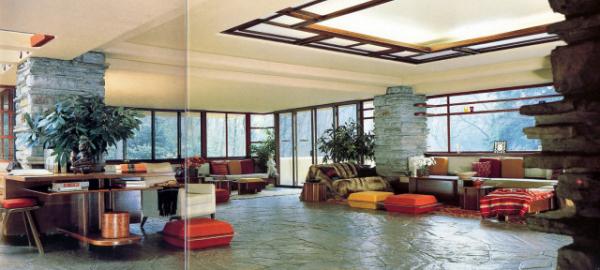| Fallingwater, PA(宾州落水山莊) |
| 送交者: 天边的红霞 2020年05月16日15:50:26 于 [五 味 斋] 发送悄悄话 |
|
2016-05-30
【Aiden in English】 Money can buy you many things. But, as the saying goes, it can’t buy happiness. What it can buy are things that make happiness. Such items like a cell phone, or food, or a mansion, all bring happiness. As for the Kaufmann’s, a rich family that owned a chain of the department stores in Pittsburgh back to the 1930s, their excessive amount of money could afford a great house, buying not only a home but also a sense of happiness. Fallingwater is a natural park where tourists pour in every day to see a house. Most people hear this statement and immediately lose interest. Hear me out, as you will soon see how the reservation and an entrance fee of $25 dollars were worth it a couple of days before you visit it during the Memorial holiday long weekend. The Kaufmann’s loved nature, so for vacation, they built a home in the middle of nowhere to escape the city life. The house was designed by a great architect Frank Lloyd Wright. The entire tour of the house was about Wright’s organic design of the house, masterfully carving in his influences on the residents of the home. The tour began in the living room. The phrase “room” does not correctly describe the house, though. More accurately, it should be called a section. Walls were a rare thing in the different parts of the house, as Wright thought they blocked off the connection between humans. Also, he loved to express the outside world. Walls got in the way of viewers, and especially for people like the Kaufmann’s, who were nature-lovers, walls were a large obstacle in their intake of nature’s looks. Wright’s design of the furniture also impacted the scenic view of people. With low chairs, tables, couches, and no shades, the room was completely empty of items that can block one’s sight of the window and the outer scene. What’s so important about the scene? Well, the spot chosen for this amazing house was on a waterfall. Picture a stream trickling over rocks, forming a small drop about ten feet or so. Then add a boxy house on the mesa literally hanging over the water. I mean, no support on or in the water. The Kaufmann’s had one of these rooms, where the bathtub was basically a large bowl with a hole to allow water to flow through. The house had to descend stairs straight into the Bear Run, and also foldable windows allowing direct contact with the spring breeze. Upstairs was just as nice. The bedrooms were small, forcing our attention outside to the light of nature. The craftiness of the building almost scared me. Wright manipulated us even after his death, which quite freaked me out. In a good way. Not only did he make us look outside, but also woke up later in the day. The beds were arranged so the sun rises in a spot where you couldn’t see it. Ideally, it would be great, but there is a thing called school… Fallingwater was once a rich man’s home. Now on display, it shows a great piece of American architecture that is unmatched. With the tour around the organic house, this experience really will “hang” with me. 【红霞译文】 金钱能用来买很多商品,但俗语说得好,金钱买不来幸福,不过添置的东西诸如手机、食物、乃至别墅都可以给人带来幸福。对于生活在上个世纪卅年代匹兹堡百货公司阔佬──卡夫曼家族来说,用花不完的银子打造出巨型私家庭院,不仅增强家庭的凝聚力,同时还提升个人的幸福感。 落水山莊实则一所天然公园,每日过往游客川流不息,为的是观赏一栋房子。多数人乍听于此兴趣骤减,但我告诉你,“国殇节”长周末期间必须提前几天预约,还要支付每人$25块大洋的参观门票。 卡夫曼一家酷爱自然,为了度假休闲,他们在一个前不着村后不着店远离市井嘈杂的密林深处打造新居,并由现代杰出建筑师弗兰克·劳埃德·赖特亲自设计,整个故居游览全部围绕赖特如何将有机建筑的设计理念巧妙地转化成实用民居而进行的。 我们先从客厅开始参观,这里所谓的“房间”并不能恰如其分地描述建筑本身的内部结构,较为准确地说应该称之为“分片”,家庭室书房会客间餐厅之间没有用墙打成隔段,赖特认为墙影响人与人之间的交流。他崇尚户外世界,墙的存在会分散人们的注意力,特别像卡夫曼一家三口个个钟爱自然,一堵墙矗在室内,势必有悖初衷。赖特所设计的家具同样从视觉效果出发,桌椅沙发低矮,室内装潢毫无色调,没有任何东西可以妨碍人们直视外界。自然场景非常重要吗?要知道落水山莊之所以新颖独特,就因为被悬挂在瀑布之上,涓涓碧水穿过岩石,飞流直下10英尺/3米左右的岩崖,这座“方山之宅”由水面腾空而起,我指的是水下水上没有柱梁支撑。卡夫曼有一个房间的浴缸形状宛若大碗,山泉可以从内设的孔眼自由穿梭。流水别墅既建有楼梯直入熊溪河道,又装有折叠窗户任春风徐徐吹进。楼上格局也别出心裁,卧室很小,以便让人一有精力就投身于大自然怀抱。落水山莊室内设计诡秘,赖特百年之后都忘不了捉弄晚辈,真令我心有余悸,当然完全是善意之举,其目的在于鼓励大家要么多多欣赏山水风光,要么好好休息养足精神。床铺头枕座东朝西,为的是让你看不到晨曦,踏踏实实地睡个懒觉。主意想得蛮好,但那个叫学校的玩意…… 落水山莊曾经是一个有钱人家的深宅大院,如今已向公众开放,在美国建筑上无与伦比,参观完这座有机建筑,一种道法自然的理念深深萦绕在我的心头。
|
|
|
|
|
 |
 |
| 实用资讯 | |
|
|
|
|
| 一周点击热帖 | 更多>> |
|
|
|
| 一周回复热帖 |
|
|
|
|
| 历史上的今天:回复热帖 |
| 2019: | 快讯:孟晚周已偷渡回中国 | |
| 2019: | 床总毫不手软:华为列为禁止出口名单可 | |
| 2018: | ZT:贸易战,川普怂了吗? | |
| 2018: | 小金胖敢玩猫腻儿,立马变成金正boom! | |
| 2017: | 北大,在崩塌。郭文贵说北大百名女生被 | |
| 2017: | 你们成天谈政治枯不枯燥啊?我贴只包包 | |
| 2016: | 中国值得同情的人很多,孙志刚,夏俊峰 | |
| 2016: | 列位大老,你门和同学都建立QQ或微信群 | |
| 2015: | 阿润在这里整天无病呻吟,最是让人讨厌, | |
| 2015: | 我所遇到的的三大宗教信徒 | |




